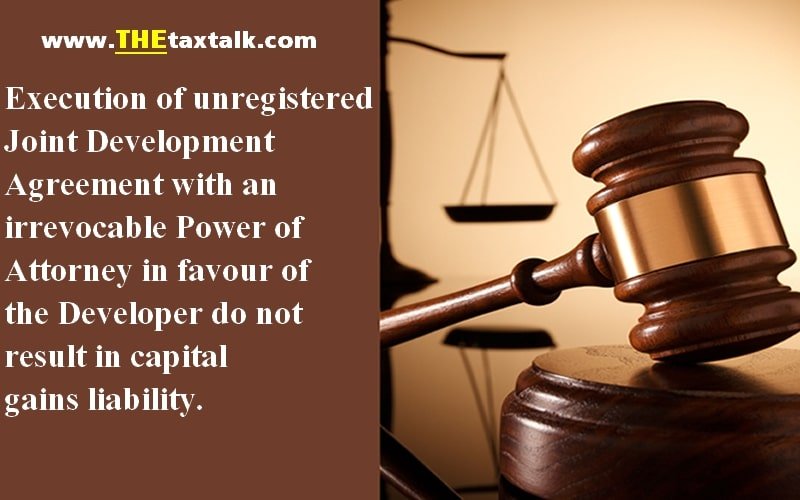![]()
Execution of unregistered Joint Development Agreement with an irrevocable Power of Attorney in favour of the Developer do not result in capital gains liability.
Short Overview Since the Collaboration Agreement for transfer of property was never registered, therefore, the presumption of delivery of possession of property to the Collaborator could not be assumed on signing the Collaboration Agreement, i.e., in assessment year 2007-08 but in assessment year 2009-10 in which the property was assessed for the transfer of capital asset.
During the course of search and seizure on S Group who was a developer of properties on collaboration agreement with the various owners, it was found that assessee as one of the ventures in collaboration agreement as one of the co-owners of the property sold out her 1/3rd share in the property for Rs. 56,00,000. The total consideration of the property for all three co-owners was Rs. 1,68,00,000. In response to notice under section 148, assessee submitted a computation of total income and had shown capital loss of Rs. 82,911 on sale consideration of Rs. 56,00,000. AO did not find the same computation proper. Assessee had categorically stated that the collaboration agreement dated 1-6-2006 was not at all registered and the constructed house was handed over by the collaborator on 19-8-2008 to assessee, the only issue involved in this appeal was as to whether the transfer took place in assessment year 2007-08 as claimed by Revenue or in assessment year 2009-10 as claimed by assessee.
It is held that The execution of unregistered Joint Development Agreement with an irrevocable Power of Attorney in favour of the Developer did not result in the “transfer” for capital gains liability. Thus, as the agreement in the present case was not registered one, it did not have any impact in the eye of law for the purpose of section 53A of the Transfer of Property Act and similarly for defining transfer under the Income Tax Act. Since the Collaboration Agreement was never registered, therefore, the presumption of delivery of possession to the Collaborator could not be assumed on signing the Collaboration Agreement, i.e., in assessment year 2007-08. Even otherwise, assessee had offered the above capital gain in assessment year 2009-10, which was the property for the assessment of the transfer of capital asset and consequent capital gain.
Decision: In assessee s favour.
Referred: CIT v. Balbir Singh Maini, CS Atwal 2017 TaxPub(DT) 4346 (SC) and Shrimant Shamrao Suryavanshi v. PralhadBhairobaSuryavanshi 2018 TaxPub(CL) 352 (SC).
IN THE ITAT, DELHI BENCH
H.S. SIDHU, J.M. & PRASHANT MAHARISHI, A.M.
Namita Dutta v. ITO
I.T.A. No. 1745/Del/2017
28 December, 2020
Assessee by: Ved Jain, Advocate and Akshit Jain, C.A.
Revenue by: Aman Preet, Sr. DR
ORDER

